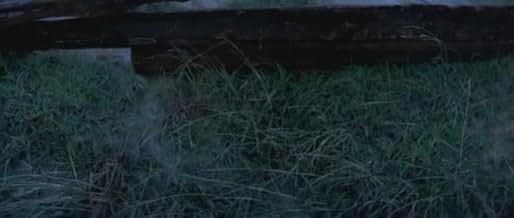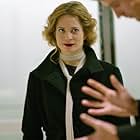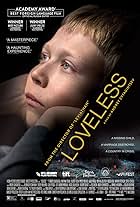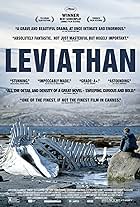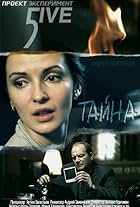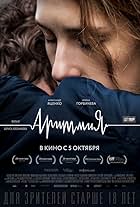IMDb RATING
7.5/10
9.2K
YOUR RATING
A trip to the pastoral countryside reveals a dark, sinister reality for a family from the city.A trip to the pastoral countryside reveals a dark, sinister reality for a family from the city.A trip to the pastoral countryside reveals a dark, sinister reality for a family from the city.
- Awards
- 8 wins & 12 nominations
Yekaterina Kulkina
- Eva
- (as Katya Kulkina)
- Director
- Writers
- All cast & crew
- Production, box office & more at IMDbPro
Storyline
Did you know
- TriviaThe film required a larger budget than it may seem because the filmmakers wanted "Izgnanie" to be "out of time and place" and did their best so the audience would not guess where and when the film took place. Even car plates and signboards were designed specially for the film. The props were bought in Germany, the "town" part of the film was shot in Belgium and northern France, and the "country" part was shot in Moldova.
- ConnectionsFeatured in Metropolis: Cannes 2007 - Special (2007)
- SoundtracksFür Alina
Composed by Arvo Pärt
Featured review
Andrei Zvyagintsev's gripping drama The Banishment plays out like Eastern Promises meets Carlos Reygadas' 2007 feature Silent Light; a combination of rather embittered Russian criminals operating and uncovering certain revelations around innocents whom later become caught up in the crossfire, with this weighty, steady visual aesthetic of rural land captured by way of long takes and eerie, heavenly music juxtaposing the on screen non-paradise we witness. Zvyagintsev's film is a minor-masterpiece, a film combining the essence of each of the above films with various cues from that of something like Coppola's Godfather films; the studious deconstruction of a family unit, not all of them necessarily criminally minded, slowly; painfully; deathfully falling apart at the seams as those of varying genders, ages and backgrounds fall away from one another because of a troupé of men's actions. It is a rigorously immersive film, a fine effort from a man firing on mostly all the cylinders he decides to shoot from; the end product formulating into a morbidly fascinating procession of drama and character.
The film will begin with a car being driven by a wounded man through rural fields split by the tarmac road his car occupies, the trees and birdsong unpleasantly disturbed by the roar of the car as it hares by. After another instance of countryside peace being disturbed, an unperturbed cut will see the car enter a more urbanised locale full of bricked up walls and factory chimneys churning out reams of smoke. The driver is a certain Mark (Baluev), a criminally orientated brother to that of Alex (Lavronenko) who lives in the city; the charging of his car past the calm, peaceful rural world during the opening shots a precursor to the sorts of later shattering of the tranquillity he and the family with whom he shares ties to. The aforementioned jolting cut between peace and countryside to city life additionally highlights a sudden change in surroundings, an example of shifting surroundings for the worse which will additionally go on to encapsulate the framework of the film and the general well-being of a family congregation. Mark is injured, but trusty brother Alex patches him up in the dead of night - his dealing with a bloody, scuzzy; grotty situation highlighting skill of a physical nature in his ability to deal with such a scenario of such a delicate, precise nature; before the film places him into a similar predicament, only of immense psychological and spiritual sorts.
With Alex lives his wife Vera (Bonnevie), whom puts up with people of Mark's ilk arriving at her home whilst she sleeps at ungodly hours; when Alex goes to lie next to her, the film providing us with the first of many eerie shots that peer straight down at the couple lying in bed facing upwards at us: very little in the way of contact nor communication and grossly varying positions as they lie situated there, as if not of a similar ilk. Following on from the opening, Alex; Vera and their son Kir with their daughter Eva journey by way of localised train network and by foot through the forests and fields to a farm house. The journey by train is, again, muted; the unit of four sharing varying poses and stances as they sit in the train's compartment avoiding eye contact; the insinuation is disenchantment or a unit not hooked up to one another.
The house they arrive at is one Alex appears highly attuned to, later reveals are that he spent time there as a boy with brother Mark; the faces of elderly and long since deceased family members peering through the exterior glass window of their photographic frames as their image hang there, looming over proceedings as they watch on from the walls. The house, of which is seemingly only accessible from the front by way of a narrow wooden bridge over a kind of moat thus inflecting it being cut off from a distinct 'other side', is a peaceful haven set isolated from civilisation amidst the scorched fields and constant sun. The family are not infallible, uncomfortable scenes such as the one that sees Vera argue with her young daughter unravel, whilst the visiting to Alex's family by neighbouring relative Viktor (Sergeev) and his family demonstrate a seemingly perfect, working unit of this nature in full flow as the distinction between his and Alex's appear even greater.
The bombshell which ruptures this existing arrives in the form of the announcement of Vera's pregnancy, a pregnancy which Alex is informed wasn't instigated by him. What follows is a slow burning sensation of dread and affliction, perpetrated out of human nature's ill-advised methods in dealing with such situations; a late night seeing off of Vikto and co. whom were visiting seeing Alex occupy a part of the porch to the left side of the screen as a distinct wooden foreground beam splits the frame down the middle, distinctly placing Vera on the other side; the film seeing it now necessary to place a physical object so as to highlight the 'split' from one another the two characters share. Zvyagintsev's film is a fine effort, instilled with an agonising and morbidly captivating air about it as we witness these people and their lives disintegrate out of a man too of-his-ilk to be making decisions whilst influencing another man whom ought to be strong enough to see sense. The contemporary cinematic antithesis to Bekmambetov's Americanised Night Watch, or indeed Bondarchuk's Hollywood war movie simulacrum 9th Company, The Banishment banishes most doubts over the Russian cinema industry's strengths and motifs.
The film will begin with a car being driven by a wounded man through rural fields split by the tarmac road his car occupies, the trees and birdsong unpleasantly disturbed by the roar of the car as it hares by. After another instance of countryside peace being disturbed, an unperturbed cut will see the car enter a more urbanised locale full of bricked up walls and factory chimneys churning out reams of smoke. The driver is a certain Mark (Baluev), a criminally orientated brother to that of Alex (Lavronenko) who lives in the city; the charging of his car past the calm, peaceful rural world during the opening shots a precursor to the sorts of later shattering of the tranquillity he and the family with whom he shares ties to. The aforementioned jolting cut between peace and countryside to city life additionally highlights a sudden change in surroundings, an example of shifting surroundings for the worse which will additionally go on to encapsulate the framework of the film and the general well-being of a family congregation. Mark is injured, but trusty brother Alex patches him up in the dead of night - his dealing with a bloody, scuzzy; grotty situation highlighting skill of a physical nature in his ability to deal with such a scenario of such a delicate, precise nature; before the film places him into a similar predicament, only of immense psychological and spiritual sorts.
With Alex lives his wife Vera (Bonnevie), whom puts up with people of Mark's ilk arriving at her home whilst she sleeps at ungodly hours; when Alex goes to lie next to her, the film providing us with the first of many eerie shots that peer straight down at the couple lying in bed facing upwards at us: very little in the way of contact nor communication and grossly varying positions as they lie situated there, as if not of a similar ilk. Following on from the opening, Alex; Vera and their son Kir with their daughter Eva journey by way of localised train network and by foot through the forests and fields to a farm house. The journey by train is, again, muted; the unit of four sharing varying poses and stances as they sit in the train's compartment avoiding eye contact; the insinuation is disenchantment or a unit not hooked up to one another.
The house they arrive at is one Alex appears highly attuned to, later reveals are that he spent time there as a boy with brother Mark; the faces of elderly and long since deceased family members peering through the exterior glass window of their photographic frames as their image hang there, looming over proceedings as they watch on from the walls. The house, of which is seemingly only accessible from the front by way of a narrow wooden bridge over a kind of moat thus inflecting it being cut off from a distinct 'other side', is a peaceful haven set isolated from civilisation amidst the scorched fields and constant sun. The family are not infallible, uncomfortable scenes such as the one that sees Vera argue with her young daughter unravel, whilst the visiting to Alex's family by neighbouring relative Viktor (Sergeev) and his family demonstrate a seemingly perfect, working unit of this nature in full flow as the distinction between his and Alex's appear even greater.
The bombshell which ruptures this existing arrives in the form of the announcement of Vera's pregnancy, a pregnancy which Alex is informed wasn't instigated by him. What follows is a slow burning sensation of dread and affliction, perpetrated out of human nature's ill-advised methods in dealing with such situations; a late night seeing off of Vikto and co. whom were visiting seeing Alex occupy a part of the porch to the left side of the screen as a distinct wooden foreground beam splits the frame down the middle, distinctly placing Vera on the other side; the film seeing it now necessary to place a physical object so as to highlight the 'split' from one another the two characters share. Zvyagintsev's film is a fine effort, instilled with an agonising and morbidly captivating air about it as we witness these people and their lives disintegrate out of a man too of-his-ilk to be making decisions whilst influencing another man whom ought to be strong enough to see sense. The contemporary cinematic antithesis to Bekmambetov's Americanised Night Watch, or indeed Bondarchuk's Hollywood war movie simulacrum 9th Company, The Banishment banishes most doubts over the Russian cinema industry's strengths and motifs.
- johnnyboyz
- Apr 20, 2011
- Permalink
- How long is The Banishment?Powered by Alexa
Details
- Release date
- Country of origin
- Official site
- Language
- Also known as
- Вигнання
- Filming locations
- Charleroi, Wallonia, Belgium(city exteriors)
- Production company
- See more company credits at IMDbPro
Box office
- Gross worldwide
- $641,101
- Runtime2 hours 37 minutes
- Color
- Sound mix
- Aspect ratio
- 2.35 : 1
Contribute to this page
Suggest an edit or add missing content






